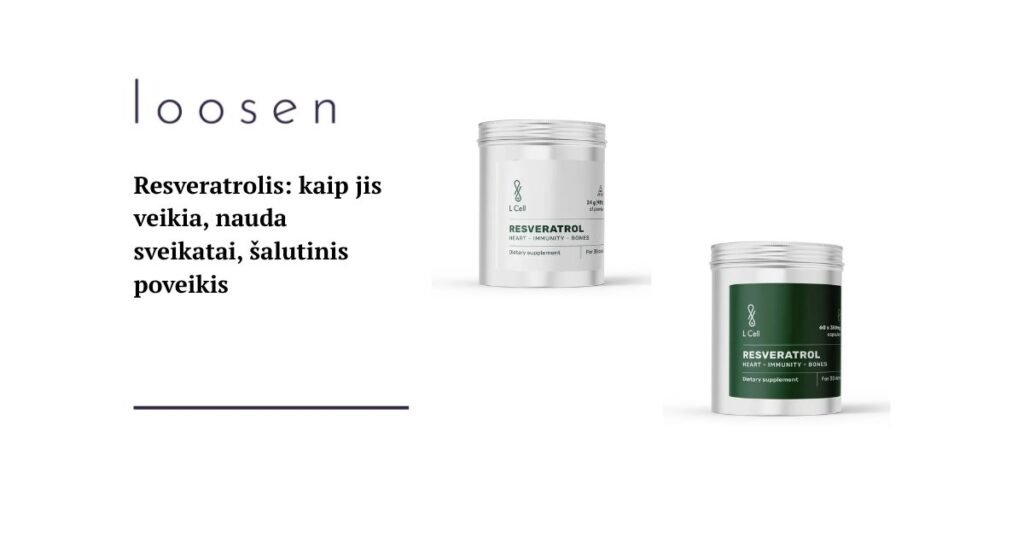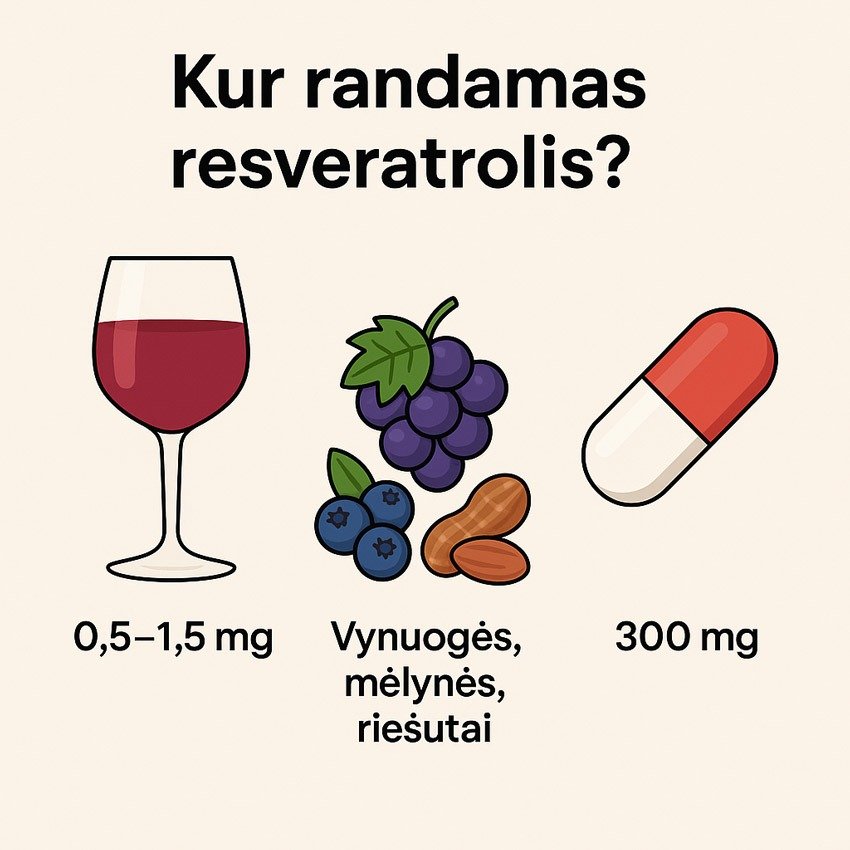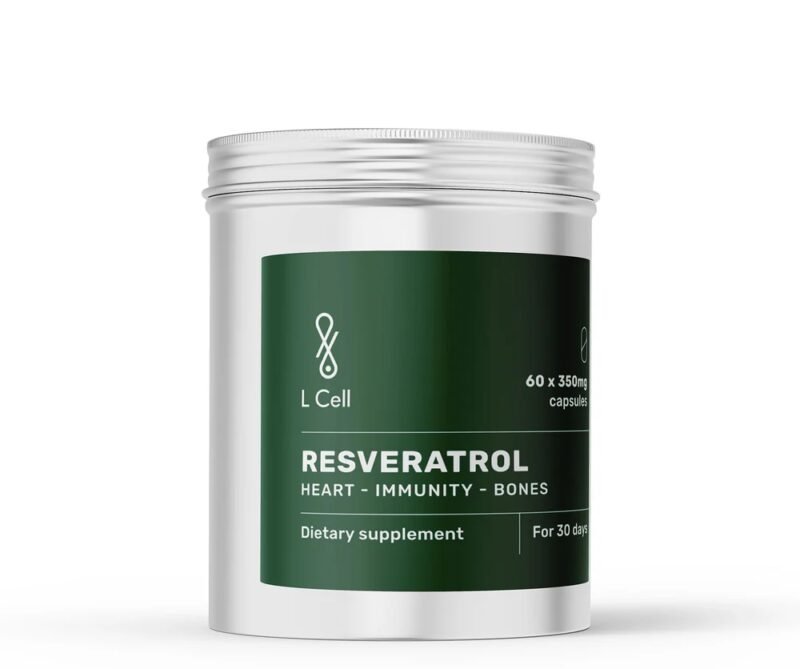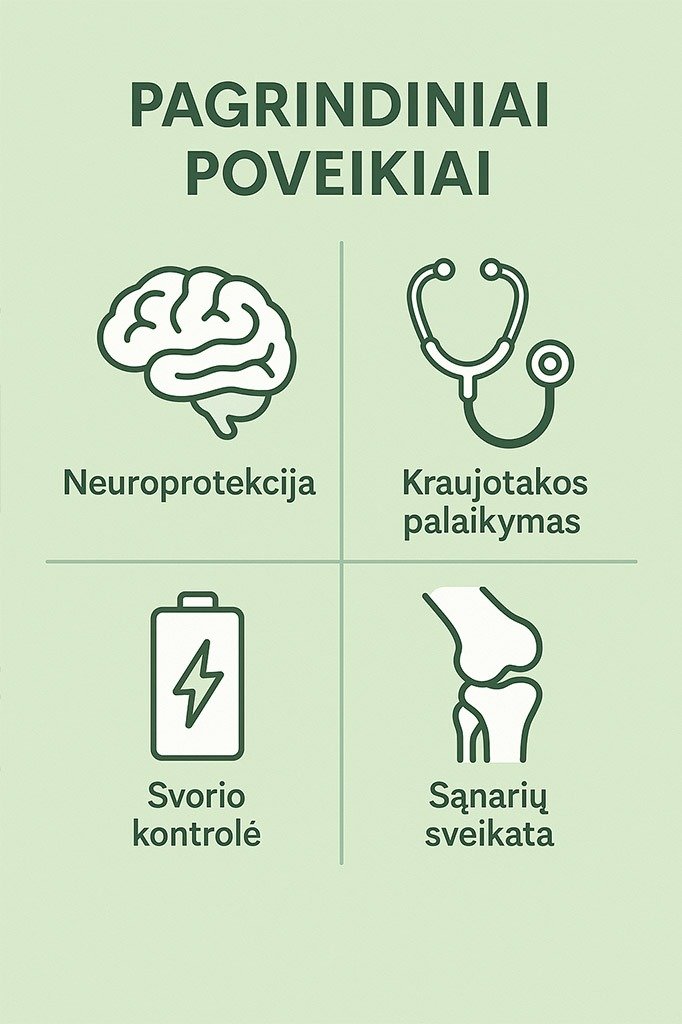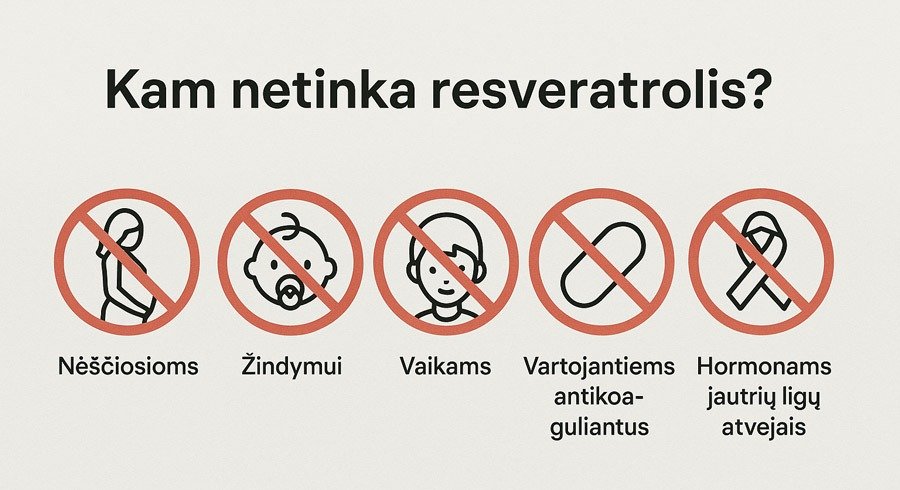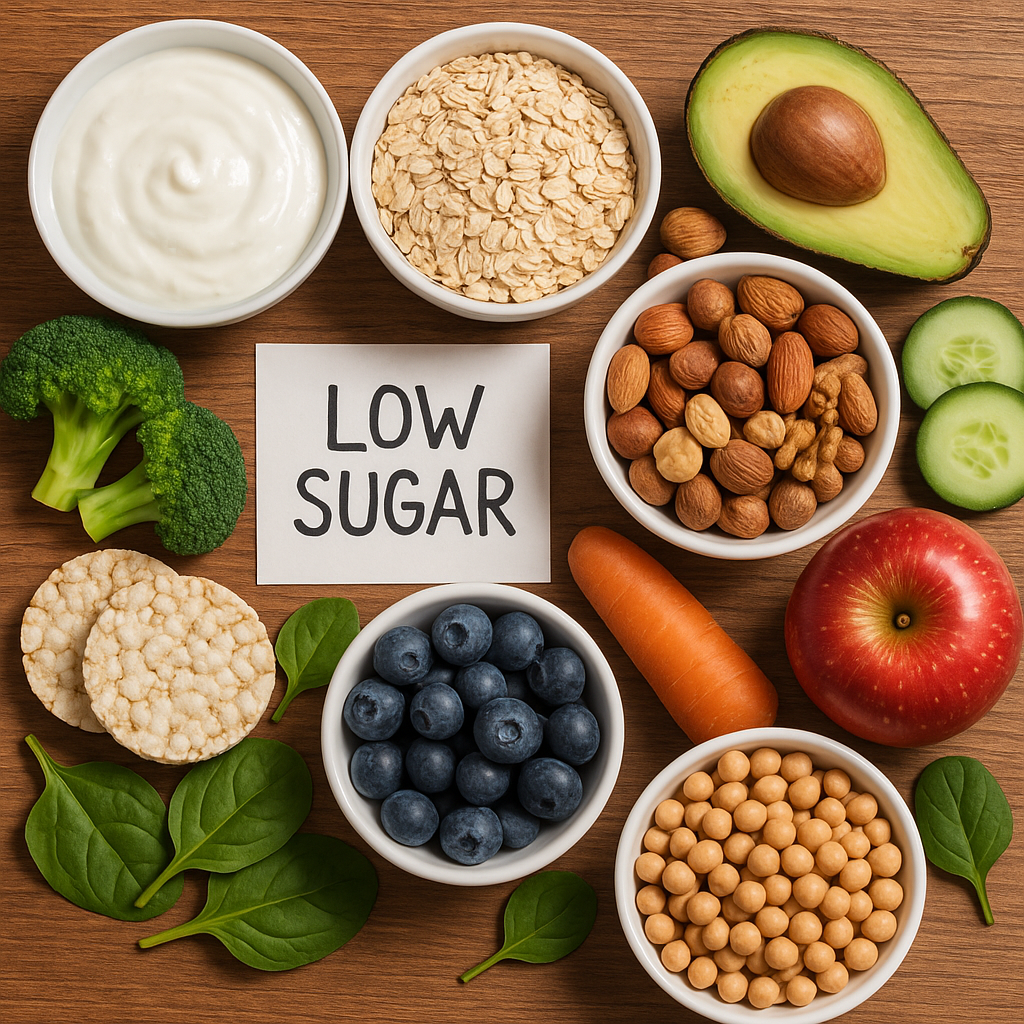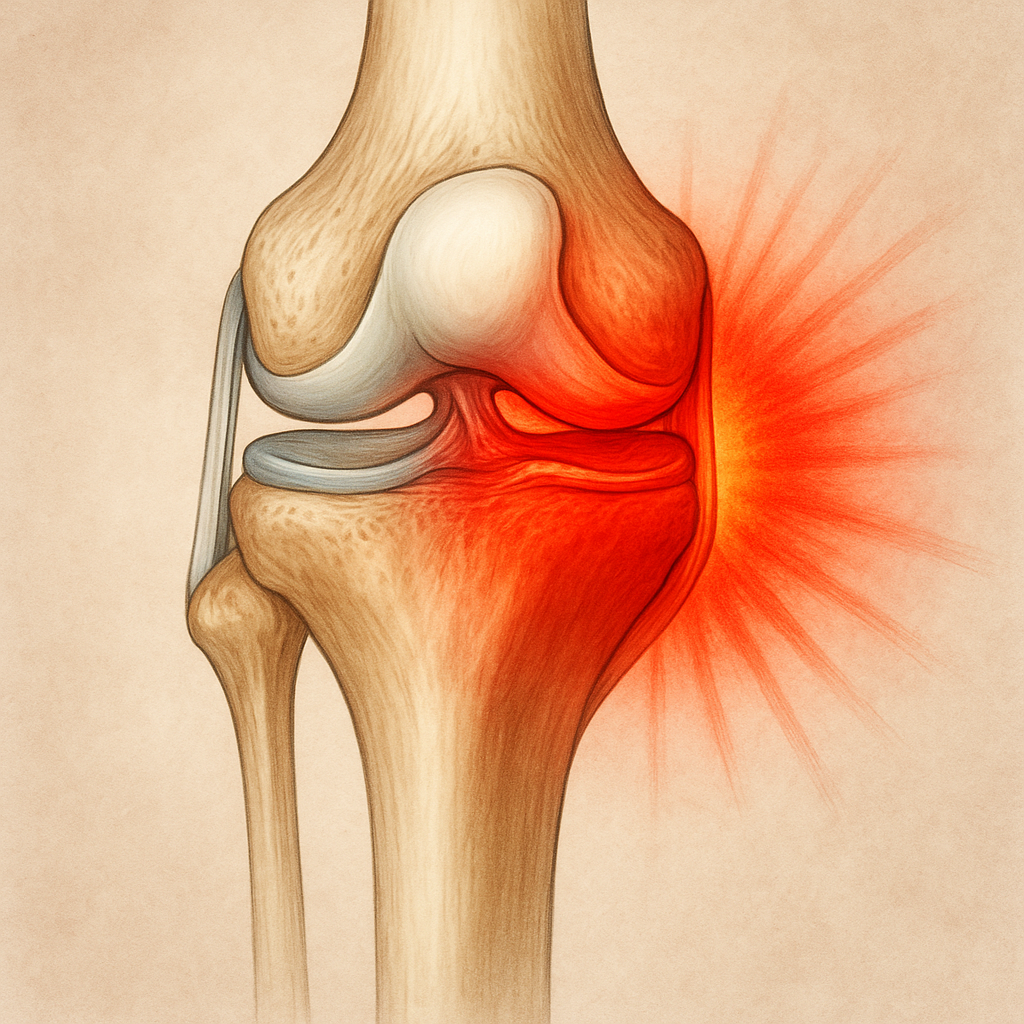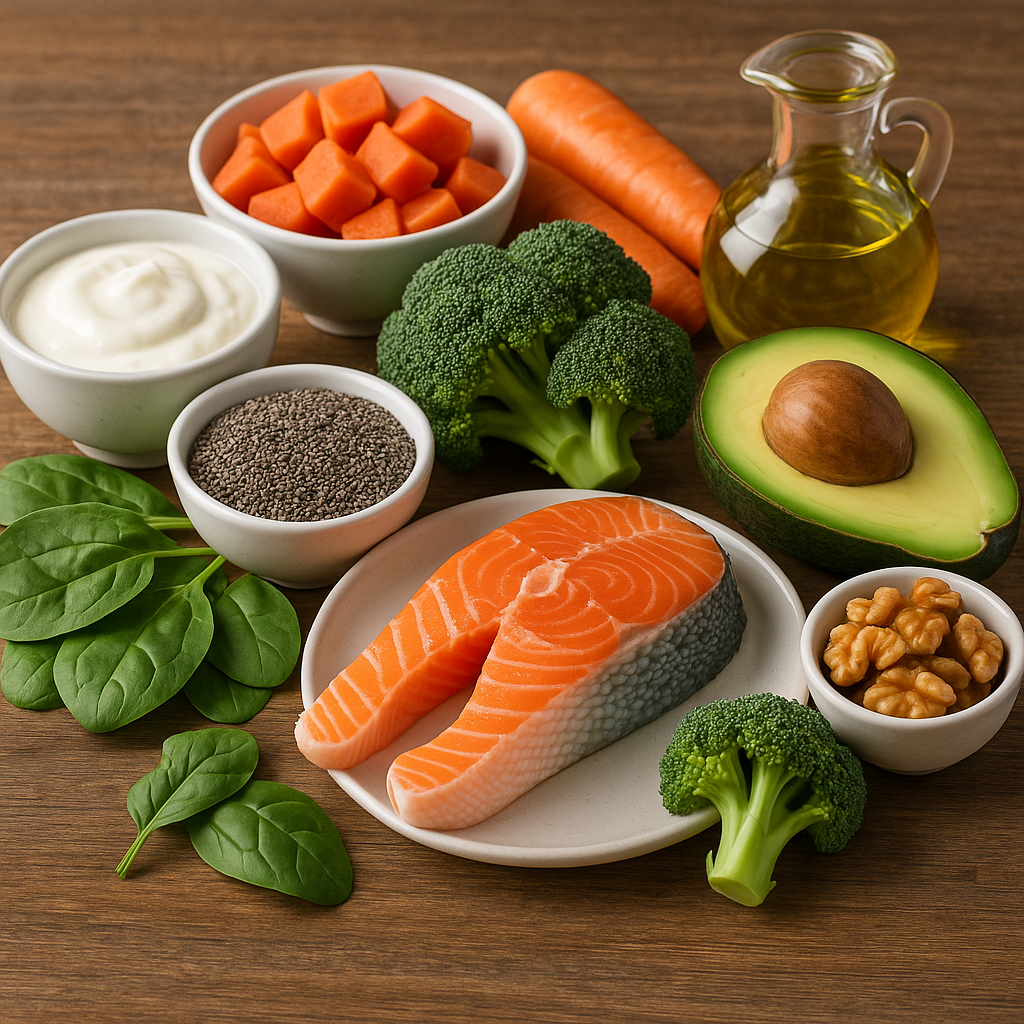Resveratrol is a natural polyphenol compound found in red wine, grape skins, blueberries, and peanuts. This antioxidant activates the cellular pathways SIRT1 and AMPK, providing anti-inflammatory, cardioprotective, and anti-aging effects.
The cellular mechanisms of resveratrol, its documented benefits in laboratory and clinical studies, its dosage guidelines, side effects, and drug interactions reveal the therapeutic potential of this compound. All of this is explored in this report, below.
Resveratrol in Brief
- Resveratrol activates the SIRT1 and AMPK pathways, mimics the benefits of calorie restriction, and extends lifespan in animal models.
- The compound provides neuroprotection by reducing inflammation, neutralizing free radicals, and maintaining the integrity of the blood-brain barrier.
Resveratrol increases insulin sensitivity, improves glucose metabolism, and contributes to weight loss. - Side effects: gastrointestinal disorders when consumed >1500 mg/day and interaction with anticoagulants.
- Supplements (300 mg/capsule) provide better bioavailability than natural sources – red wine (0.5-1.5 mg/glass).
How does resveratrol work in the body?
Resveratrol works through SIRT1 activation, AMPK signaling, and NF-κB inhibition. The compound regulates biological processes throughout the body.
In cancer cells, resveratrol induces programmed cell death (apoptosis), while in healthy cells it activates SIRT1 and enhances repair mechanisms. The compound induces autophagy via the mTOR/TFEB pathways and inhibits NF-κB activation during viral infections.
In the area of metabolism, resveratrol activates the AMPK enzyme, improves mitochondrial biogenesis, and enhances fatty acid oxidation. Antioxidant protection is realized through the Nrf2 pathway, which stimulates endogenous antioxidant enzymes.
Anti-inflammatory properties are manifested by inhibiting pro-inflammatory cytokines TNF-α, IL-6, IL-1β, and modulating TLR signaling cascades. In diabetes models, resveratrol effectively reduces oxidative stress and neuronal toxicity via SIRT1 mechanisms.
High-quality trans-resveratrol supplements from Japanese primrose extract (>98% purity) ensure optimal biological effects.
Resveratrol supplements
Trans Resveratrolis kapsulės 300mg (60 vnt.)
High quality resveratrol capsules for heart, joint health and longevity. Each capsule contains 300 mg of resveratrol >98% pure from Japanese red mulberry extract.
Key features:
- Supports heart and circulation
- Maintains bone and joint strength
- Senomorphic effect – inhibits the spread of SASP and fights free radicals
Product Features:
- Pack of 60 capsules (>30 days of use)
- 98% purity of resveratrol from natural Japanese renutra extract
- Supplemented with zinc (1.5mg), thiamine/vitamin B1 (0.165mg), vitamin D (0.75μg)
- Vegan HPMC capsule coating, suitable for the digestive system
- Manufactured according to pharmaceutical standards in EU factories
- Free of GMOs, artificial colors, preservatives, fragrances, allergens
- Regular laboratory tests for heavy metals and mycotoxins
Dosage: 1-2 capsules during breakfast, with water.
Trans Resveratrolis milteliai 24g >98% grynumas
Neutral tasting resveratrol powder for maximum absorption with fat-soluble foods. High-dose form with >98% purity.
Product Features:
- 24g neutral-flavored powder (30+ days of intensive use)
- Includes 0.5ml measuring scoop (~400mg resveratrol)
- 98% pure resveratrol from Japanese knotweed extract
- Supplemented with zinc (1.5mg), thiamine/vitamin B1 (0.165mg), vitamin D (0.75μg)
- Suitable for vegans
- Manufactured according to pharmaceutical standards in an EU factory
- No GMOs, artificial colors, preservatives, fragrances, allergens
- Regular laboratory tests for quality assurance
Dose: 1-2 scoops in the morning, mixed with yogurt, olive oil or other fat-soluble food for better absorption.
Benefits of Resveratrol
Studies document the neuroprotective properties of resveratrol, including the clearance of β-amyloid and the reduction of neuroinflammation. Clinical studies support the compound’s ability to increase insulin sensitivity and regulate glycemia, while reducing adipose tissue through metabolic modulation.
Resveratrol exhibits anticarcinogenic activity by inhibiting cell proliferation and angiogenesis. The compound reduces inflammatory processes associated with joint discomfort by acting as an antioxidant against free radicals.
Protects brain function and slows cognitive decline
Resveratrol protects brain function and slows cognitive decline through its neuroprotective effects. Clinical studies have shown improvements in ADAS-Cog (-0.77 points compared to the control group) and increased cerebral blood flow in areas important for cognitive processes.
The compound acts through 4 protective mechanisms: anti-inflammatory effects to reduce neuroinflammation, antioxidant properties to neutralize reactive oxygen species, anti-apoptotic effects to prevent neuronal death, and enhancement of neurotrophic factors to promote neurogenesis.
Resveratrol activates sirtuins, mimics the benefits of calorie restriction, and modulates Nrf2 pathways for antioxidant response. Preclinical studies show a reduction in Alzheimer’s disease pathology – a decrease in amyloid-beta plaques and tau lesions.
The compound supports blood-brain barrier integrity and neurovascular health, essential for preserving cognitive abilities during aging.
Regulating blood sugar levels and insulin sensitivity
Resveratrol promotes healthy blood sugar levels and increases insulin sensitivity through molecular mechanisms. Clinical data show a reduction in insulin resistance (HOMA-IR) and activation of SIRT1, AMPK, GLUT4 pathways, improving glucose uptake.
Studies document stronger insulin signaling – increased ratio of phosphorylated to total Akt proteins and suppressed FOXO1 expression through SIRT1 activation. Meta-analyses of clinical trials confirm the reduction of fasting glucose, HbA1c and inflammatory cytokines.
In the diabetic population, resveratrol improves glucose metabolic clearance and reduces markers of oxidative stress, including ortho-tyrosine. These mechanisms ensure better glucose metabolism and reduced insulin resistance.
May help regulate weight
Resveratrol reduces body weight, BMI, waist circumference and fat mass, especially visceral fat, when taken in combination with other polyphenols. Weight loss is achieved through the stimulation of brown fat activity, increased fat burning, inhibition of new fat cell formation and enhancement of thermogenesis via the AMPK/SIRT1 pathway.
A daily dose of 500 mg effectively reduces fat mass and preserves muscle mass during calorie restriction. The supplement works synergistically with weight management medications and lifestyle changes to ensure long-term metabolic health, reduce inflammatory markers and increase adiponectin for healthier fat distribution.
Possible anticancer properties
Resveratrol can inhibit cancer growth through cell cycle arrest, apoptosis activation, and inhibition of STAT3, mTOR, PI3K/Akt pathways. The compound may be particularly effective against breast, prostate, and pancreatic cancers by modulating hormone-dependent pathways and epigenetic mechanisms.
In cancer prevention, resveratrol can activate p53, induce autophagy-dependent tumor dormancy, and neutralize oxidative stress that causes DNA damage. The compound may improve the outcome of conventional treatment by sensitizing resistant cancer cells to chemotherapy and radiation while protecting healthy tissues.
Its anticancer properties operate through a network of molecular mechanisms targeting cancer markers. Studies suggest that resveratrol may favor malignant cells over healthy cells, making it a suitable adjunct to standard treatment.
May reduce joint pain and inflammation
Resveratrol can reduce joint pain, inflammation, and protect cartilage. The compound inhibits inflammatory pathways – NF-κB activation and MAPK signaling, regulating the cytokines TNF-α, IL-6, and IL-1β. These effects correlate with pain relief and reductions in inflammatory markers in preclinical studies.
In cartilage protection, resveratrol can reduce the destructive enzymes MMP3/9/13 by 40%, and increased aggrecan synthesis improves repair. The compound promotes joint health by maintaining chondrocyte viability, promoting autophagy, and providing anti-apoptotic mechanisms that improve mitochondrial function and reduce oxidative stress.
These cell-protective actions may slow joint degradation and delay the progression of osteoarthritis, showing therapeutic benefit in people with inflammatory joint diseases.
May extend lifespan (animal studies)
In animal studies, resveratrol can significantly extend lifespan through longevity-promoting mechanisms. Studies in multiple species have shown significant effects – yeast have been shown to increase lifespan by 70% due to activation of SIRT1, and honeybees have been shown to increase lifespan by 33-38% at concentrations of 30-130 μM. 60% of controlled studies have shown positive longevity effects.
Key mechanisms:
- SIRT1 activation increases DNA stability and cellular repair mechanisms
- Dose-response relationships indicate optimal efficacy at moderate concentrations
- In vertebrate models, median lifespan is increased by 33-56%
- Neuroprotective effects are associated with delayed age-related cognitive decline
Translating findings to mammalian models presents methodological challenges – standardization of administration protocols and effective doses across species.
Is Resveratrol Safe? Side Effects and Risks
Resveratrol may cause gastrointestinal upset (nausea, diarrhea) at doses exceeding 1500 mg/day and serious neurological symptoms at high concentrations.
The compound may interact with anticoagulants, increasing the risk of bleeding – use should be discontinued 2 weeks before surgery. Individuals with hormone-sensitive conditions (breast cancer, endometriosis) may need to avoid resveratrol due to its estrogen-like activity.
Long-term use of high doses (>3000 mg/day) may be burdensome to the liver and kidneys. Safety data beyond 6 months of continuous use are insufficient.
Current recommendations: oral supplementation at standard doses is tolerated for ≤3 months, topical application is safe for ≤30 days.
Who should avoid resveratrol?
4 main groups should avoid resveratrol supplements: individuals with hormone-sensitive conditions, pregnant/breastfeeding women, children, and individuals taking blood thinners.
Individuals with hormone-sensitive conditions (breast cancer, endometriosis, estrogen receptor-positive tumors) should avoid resveratrol due to its estrogenic properties that may affect their condition.
Pregnant and breastfeeding women should avoid this supplement due to insufficient safety data and potential effects on fetal or infant development. Children are not suitable for resveratrol supplements due to the lack of clinical validation in the pediatric population and potential effects on natural growth processes.
Patients taking anticoagulants or antiplatelet drugs (warfarin, aspirin, clopidogrel) are at increased risk of bleeding when co-administered with resveratrol. Supplement use should be discontinued 14 days before and after surgical procedures.
These contraindications reflect the complex pharmacological profile of resveratrol, particularly its sensitivity to hormones and effects on blood clotting.
Natural vs. Supplement Sources
Dietary supplements have better bioavailability (300 mg/capsule) compared to natural sources (0.5-1.5 mg/glass of red wine), giving an advantage to individuals seeking therapeutic effects.
Natural sources of resveratrol face limitations: processing losses during food preparation, variable potency levels, and insufficient systemic exposure. Third-party testing raises concerns about reliability – 70% of supplements do not meet label claims.
Supplement efficacy benefits from standardized dosing and improved absorption, while dietary restrictions prevent the achievement of therapeutic limits established by studies. Harvard Medical School research shows that resveratrol-rich diets do not show significant health benefits, challenging natural methods of consumption.
By 2034, the supplement market will grow from 118.6 million euros to 327.5 million euros. euros, as consumers prefer concentrated forms despite doubts about quality.
Is resveratrol effective in helping you lose weight?
Clinical studies have shown that resveratrol may contribute to modest weight loss by activating metabolic pathways, resulting in reduced weight, BMI, waist circumference, and fat mass.
Resveratrol works by activating the SIRT1/AMPK pathway, enhancing mitochondrial function and energy expenditure, and influencing fat cell development. Evidence suggests a supportive role in weight management programs, particularly in individuals with metabolic disorders.
Recommended daily dose: 500-1500 mg, divided into 3 doses per day for long-term metabolic effects. Supplements are most effective when taken with meals for maximum absorption. Combining with lifestyle changes may yield better results than supplements alone.
In addition to weight management, resveratrol may reduce LDL cholesterol and increase insulin sensitivity, although larger clinical trials are needed to determine definitive efficacy.
Can resveratrol help with arthritis or joint pain?
Resveratrol may reduce arthritis symptoms and joint pain through anti-inflammatory mechanisms. Clinical trials with a daily dose of 500 mg have shown improved pain scores and functional outcomes in patients with osteoarthritis of the knee.
Studies have shown inhibition of inflammatory pathways (NF-κB, MAPK) and downregulation of pro-inflammatory cytokines (TNF-α, IL-1β, IL-6) associated with joint destruction. Chondroprotective properties include inhibition of matrix degrading enzymes and prevention of chondrocyte apoptosis.
Resveratrol is beneficial in the treatment of arthritis through 3 mechanisms: activation of SIRT1/AMPK, inhibition of COX-2/PGE2, and improved cartilage matrix synthesis. The compound has a favorable safety profile compared to NSAIDs as an alternative or adjunctive approach to joint health.
Recommended dosage: 500 mg daily.
Is it safe to take resveratrol long-term?
Resveratrol poses little risk at standard doses of up to 2 g/day for up to 1 year, but safety for longer periods has not been established.
Long-term safety data >1 year are limited – most studies have focused on shorter durations (weeks-months). Clinical data suggest relative safety at doses ≤2 g/day, particularly in the elderly population, where 1-year studies have shown minimal adverse events.
Current research findings:
- Despite extensive clinical evaluation, no threshold for toxicity has been established
- Individual metabolism and gut microbiota lead to large dose variability
- Observational data suggest no association between urinary resveratrol metabolites and mortality
- Limited long-term cohort studies evaluating exposures from food rather than supplements
Resveratrol: FAQ
Can resveratrol interact with medications or affect blood clotting?
Yes, resveratrol interacts with medications and will affect blood clotting. The compound modulates CYP450 enzymes, altering drug metabolism. Resveratrol inhibits platelet aggregation and impairs blood clotting, so there is a risk when used with anticoagulants.
Individuals taking medications (especially blood thinners) should consult a doctor before starting resveratrol supplements. It is important to consider drug interactions, bleeding risk, and individual health factors – existing clotting disorders or upcoming surgical procedures.
How quickly can you expect to see the benefits of resveratrol?
Resveratrol benefits are seen within 1-2 months, the time depends on the individual. The reduction in inflammatory markers occurs at different rates: changes in TNF-alpha in ≤9 weeks, reduction in CRP after 9 weeks.
Resveratrol’s effectiveness is related to sufficient intake – ≥15 mg per day provides benefits. Regular supplementation, individual metabolism, health status, and quality of supplements will affect the rate of anti-inflammatory and antioxidant effects.
Is resveratrol effective for skin health and anti-aging?
Resveratrol may be effective for skin health and anti-aging, but research is incomplete. Clinical data suggests efficacy for skin health through rejuvenation mechanisms. Antioxidant properties prevent photoaging, molecular pathways promote collagen synthesis, and reduce inflammatory processes.
3 important properties for skin health: antioxidant capacity, anti-inflammatory effects, and collagen-building properties.
Does resveratrol affect men and women differently?
Yes, resveratrol has different effects on men and women. Studies show gender differences in efficacy due to sexually dimorphic responses in the metabolic, inflammatory, and cardiovascular systems. Hormonal influences, particularly estrogen-like properties, lead to different physiological outcomes between the sexes.
4 important factors: antioxidant properties, bioavailability, metabolic pathways and interaction with sex hormones. Individual differences in metabolism and hormone levels will affect the results differently for each gender.
Do resveratrol supplements improve sleep quality?
Resveratrol supplements may improve sleep quality, but research is mixed. Preclinical data suggests that activating SIRT1 is beneficial, but efficacy in humans needs to be further investigated in controlled studies.
Important factors: antioxidant properties, anti-aging effects and presence in foods (grapes, red wine, berries).

